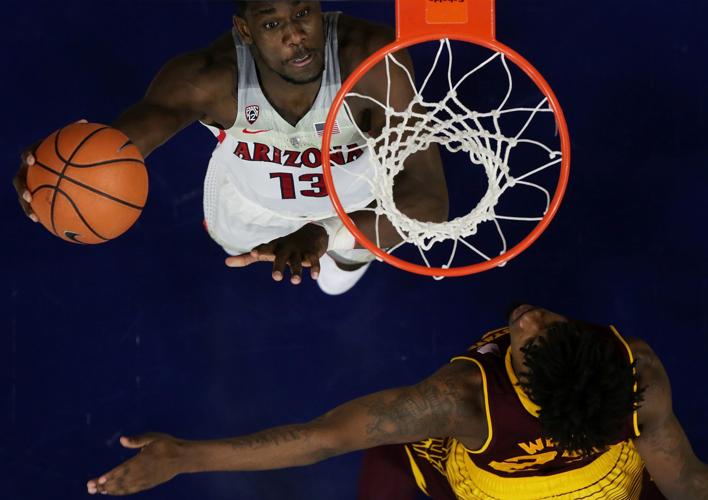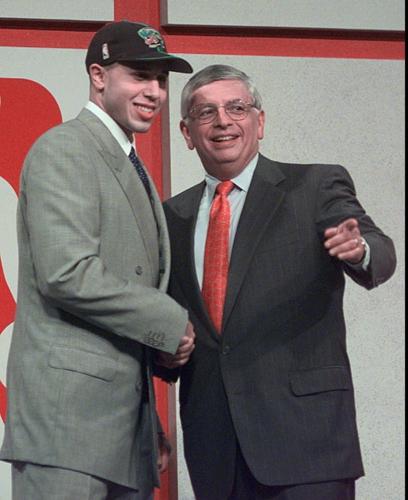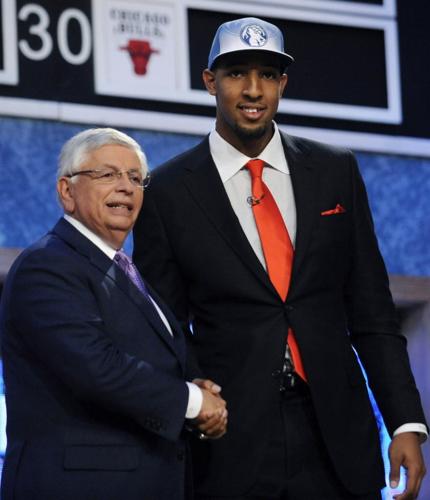Upon leaving Arizona in 1998 as a star sophomore point guard, Mike Bibby opted to work out for only one NBA team: the Los Angeles Clippers, who held the No. 1 pick.
There was plenty of buzz that the strategy would pay off, that the Clips would indeed make Bibby the Arizona Wildcats’ first top NBA pick ever.
Instead, Los Angeles chose Pacific’s Michael Olowokandi, a native of Nigeria who grew up in England and had played organized basketball for only three seasons … but was 7-foot-1.
“You always take the good big man over the good little guy,” said Elgin Baylor, the Clippers’ general manager at the time.
Only the Clippers picked the wrong big guy.

Arizona’s Deandre Ayton may be the consensus No. 1 pick this year. “It’s a no-brainer,” said former Wildcat Corey Williams.
Olowokandi averaged 8.3 points over 500 career games and is today generally regarded as one of the biggest NBA draft busts ever. Dirk Nowitzki fell all the way to ninth in the 1998 draft, won a championship with the Dallas Mavericks and is still playing in the league.
And Bibby? He averaged 14.7 over 1,001 games, a solid NBA career that earned him $107 million. His draft-night slip left Arizona without a No. 1 pick, a curious distinction that still remains today … at least until a uniquely skilled Bahamian 7-footer named Deandre Ayton crosses the stage at Thursday’s NBA draft.
The Wildcats have virtually all the other credentials of membership among the college basketball elite. Sixteen outright or shared Pac-10/12 titles. Four Final Fours. Perennial top-10 recruiting classes. And 13 top-10 NBA draft picks.
Just not a No. 1 pick.
Not in 1998. Not in 2011, when Derrick Williams understandably slipped one spot below top choice Kyrie Irving.
And not in 1989, when the Sacramento Kings held their choice for No. 1 close to the vest and ... picked Louisville power forward Pervis Ellison over Arizona’s Sean Elliott, the consensus national player of the year, as well as Glen Rice and Stacey King. The Clippers then produced another mild surprise when they chose the 6-10 Danny Ferry at No. 2.

Mike Bibby, left, was a potential No. 1 pick in 1998, when he went to the Grizzlies at No. 2.
Elliott went No. 3 to San Antonio, and Rice, like Elliott a small forward, went No. 4 to Miami.
Elliott and Rice went on to become NBA All-Stars; Ellison and Ferry were mediocre pros.
Former UA forward Corey Williams, who played professionally in Europe and now serves as a college basketball television analyst, said he isn’t surprised with the way the Wildcats have produced.
“Arizona lottery picks have always performed as expected or better, so the lack of a No. 1 seems kind of strange,” Williams said. “I think a lot of it has to do with being ‘Point Guard U’ … (because) the NBA has had a long love affair with height.”
Which makes Ayton even more of a compelling option as this year’s No. 1 pick.
With height and considerable offensive skills both inside and out, Ayton is the consensus No. 1 pick of the major mock NBA drafts, with ESPN, USA Today, Sporting News, HoopsHype and the Ringer all expecting the Suns will take the adopted Arizonan.
“It would be a shock if they went another route,” USA Today wrote.
No doubt Ayton and those around McKale Center think so, too.
“I know I’m going No. 1,” Ayton said after working out for the Suns earlier this month.
Said UA coach Sean Miller: “I look at the NBA as trying to figure out who they’re going to pick from No. 2 to 60. I think the No. 1 pick’s in. There’s nobody like Deandre. Nobody.”
Added Williams: “It’s a no-brainer. It’s not even close.”

David Stern welcomes the No. 2 overall pick, Arizona’s Derrick Williams, at the 2011 draft.
The reasons why are obvious: Ayton has once-in-a-generation potential, being an exceptionally skilled big man who can shoot, dribble, pass and move like a player much smaller while rebounding and dominating inside like the 7-footer he is.
He also knows he has more work to do.
“You look at his physical assets and they’re great,” Williams said. “But his biggest asset is that he’s coachable. He’s humble. Upside doesn’t mean anything if you’re not coachable. That’s what’s determines your longevity in the NBA.”
What nitpicking there is left to be done is mostly on the defensive end. There have been questions since before Ayton arrived at Arizona about how well he can defend and how motivated he really is to do so.
ESPN draft analyst Jonathan Givony, who has Ayton going No. 1 and has plenty of praise behind that choice, is among the many who still wonder.
Defense “is a big question mark,” Givony said on a recent ESPN video. “There’s some question marks about his instincts. He struggles a little bit to step out in pick and roll situations. A little bit heavy-footed. The reactions are a split second late. Not much of shot-blocker; doesn’t really get in the passing lanes. In today’s NBA you have to be able to anchor your defense if you’re a center.”
The Ringer questioned whether Ayton’s “instincts are poor,” and noted that Ayton’s “low block and steal rates are notable considering his elite measurables and theoretical defensive potential.”
It may have also been notable that 6-8 Stanford forward Reid Travis, who pulled out of the NBA draft pool and is transferring instead, caused Ayton particular mismatch anguish. Travis had double-doubles in both UA-Stanford games last season and, at one point during a Jan. 20 game at Maples Pavilion, yelled to his teammates that Ayton “can’t guard me!”
But Miller has a rebuttal to offer. He played Ayton at power forward last season, forcing the 7-footer to guard smaller, quicker players. Mostly, Ayton adapted.
“He guarded a face-up player,” Miller said. “He switched ball screens at 7-foot-1. He guarded 3-point shooters. He played pick-and-roll defense, transition defense. He guarded every type of player that he will see in the NBA.
“I’ve never seen a big guy, ever — a lot of the players that I coached in USA Basketball included — that moves quicker and has a better command 20-30 feet away from the basket than Deandre.”
Williams said it was also hard to judge what Ayton could really do defensively because of the way opposing offenses tried to work around him.
“No one wanted to post him up so that put him in position of being a help defender,” Williams said. “He didn’t see one-on-one defense because nobody wanted to challenge him in the post.”
The Suns had questions about Ayton’s comfort level and accuracy on the perimeter, but Ayton may have taken care of that during his June 6 workout in Phoenix.
Suns general manager Ryan McDonough noted that it wasn’t Ayton’s role to take a lot of 3-pointers last season — he averaged exactly one attempt per game, and hit them at a 34.3-percent rate — but indicated Ayton fired away in Phoenix with success.
“He has really good form, good touch, good rotation on the ball for a guy that size, especially. That was a little bit unique,” McDonough said. “He shot the ball very well.”
There’s also that matter of undeniable connections that point to an Ayton-Suns relationship.
Ayton moved from the Bahamas to San Diego at age 12, then to Phoenix as a high school junior. He spent two seasons playing for Phoenix Hillcrest Prep. His mother moved to Phoenix from Nassau to join him.
When Ayton chose in September 2016 to play for the Wildcats, his cited his mother’s comfort level as a reason he wanted to stay in the state.
And the Suns? Besides their considerable needs on the floor, there’s also the fact that their owner, Robert Sarver, just happens to be a UA graduate.
Could this really turn out any other way?
Probably not. But NBA draft history says you never know.





